 Petzlover
Petzlover Dalmador is originated from United States but Pudelpointer is originated from Germany. Dalmador may grow 10 cm / 3 inches shorter than Pudelpointer. Both Dalmador and Pudelpointer are having almost same weight. Both Dalmador and Pudelpointer has same life span. Both Dalmador and Pudelpointer has same litter size. Dalmador requires Moderate Maintenance. But Pudelpointer requires Low Maintenance
Dalmador is originated from United States but Pudelpointer is originated from Germany. Dalmador may grow 10 cm / 3 inches shorter than Pudelpointer. Both Dalmador and Pudelpointer are having almost same weight. Both Dalmador and Pudelpointer has same life span. Both Dalmador and Pudelpointer has same litter size. Dalmador requires Moderate Maintenance. But Pudelpointer requires Low Maintenance
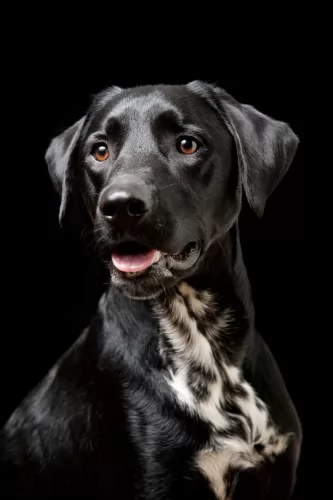 The Dalmador is a cross-breed – a mix between a Dalmation and a Labrador, and because it is a a fairly new breed you won’t find much information about the dog’s origins.
The Dalmador is a cross-breed – a mix between a Dalmation and a Labrador, and because it is a a fairly new breed you won’t find much information about the dog’s origins.
We do know that the Labrador originated in Canada and that the Dalmation comes from Croatia. Both these dog breeds have their own interesting histories. The Dalmador is a hybrid dog and isn’t a member of the American Kennel Club.
They started coming about from the 1980s when mixing one pure-breed dog with another became popular.
 The Pudelpointer is cross between the Poodle and the English Pointer. The first Pudelpointer was bred in 1881 by Baron Von Zedlitz in Germany.
The Pudelpointer is cross between the Poodle and the English Pointer. The first Pudelpointer was bred in 1881 by Baron Von Zedlitz in Germany.
The idea was to bring about a gun dog highly skilled in tracking and retrieving. The Pudelpointer was introduced to North America in 1956, and in 1977 the Pudelpointer Club of North America was established.
Because breeders have avoided recognition by the American Kennel Club, the Pudelpointer never became a well known breed in the United States.
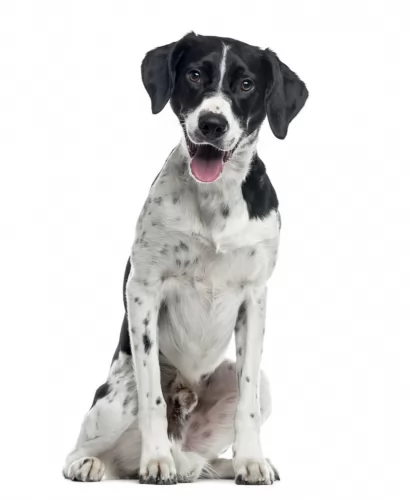 The Dalmador is a cross breed dog which comes from crossing the Labrador Retriever with a Dalmatian. The result is a muscular, well proportioned body.He has floppy ears and a long tail.
The Dalmador is a cross breed dog which comes from crossing the Labrador Retriever with a Dalmatian. The result is a muscular, well proportioned body.He has floppy ears and a long tail.
He is medium to large sized dog and can stand up to 58cm in height and weigh between 25 and 32kg. No two dogs look the same and some dogs gravitate more towards the one breed while others toward the other.
Most Dalmadors have the spotted coat, although the coat could have very visible spots or maybe just a few dots on the fur. Then again there are some Dalmadors where the coat is more of a solid color in brown or black or cream with some white patches. The double coat is short and dense and he is quite a heavy shedder.
The Dalmador is a gentle, friendly dog, making him a great family pet. You can’t really say exactly what temperament your Dalmador will have as he could inherit either the Dalmatian’s more aloof nature or he could inherit the friendly character of the Labrador.
He is quite likely to be even-tempered and is amicable with other pets in the home. He is alert too and this makes him a good watchdog. Because the Dalmador is the hybrid of two active, alert, intelligent breeds you can expect a dog which for some will be quite a handful. It is why training and socialization can be excellent for the Dalmador as it will calm him down, turning him into an obedient dog who comes and sits when told.
If you’re looking for an energetic, active and highly social dog, the Dalmador will suit an active family that can join in with all his high jinks.
 The Pudelpointer stands at between 55 and 68cm in height and weighs between 20 and 30kg. He is a medium sized dog with a weather resistant, double-layered coat. The coat doesn’t shed much and is usually a brown, chestnut, liver or black color.
The Pudelpointer stands at between 55 and 68cm in height and weighs between 20 and 30kg. He is a medium sized dog with a weather resistant, double-layered coat. The coat doesn’t shed much and is usually a brown, chestnut, liver or black color.
The coat is usually dense, harsh and wiry. They have floppy ears with quite a unique feature - the mustache on the muzzle. The tail is docked, with about 30% being removed, giving the dog an attractive, distinctive look.
Full of energy, the lively Pudelpointer will love to find himself in a family where they are active, outdoorsy types. He loves water too, and when out on a hike, if there’s water around, he’ll be the first to jump right in.
He’s an intelligent dog too, eager to please and ready to learn. He can easily be trained and socialized. He is loyal, calm and loving and will get on well around children and other animals in the home. He is also protective and makes a good watchdog.
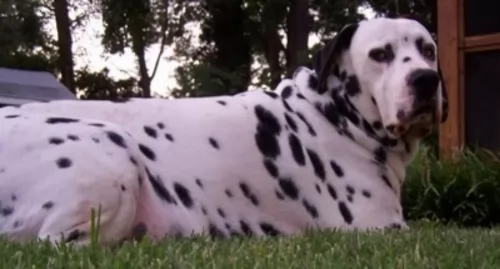 The wonderful Dalmador is such a easy-going, cheerful dog full of surprises really, as you never know which dominant traits he will inherit from either of the two dogs involved in his making.
The wonderful Dalmador is such a easy-going, cheerful dog full of surprises really, as you never know which dominant traits he will inherit from either of the two dogs involved in his making.
Friendly and social, he loves his human family and is totally loyal and loving toward them. Even tempered and faithful, if you’re looking for a wonderful 4-legged friend and companion, the Dalmador promises to make you a splendid pet.
 The Pudelpointer may well be a gun dog but when it comes to his human family he is a social, loving companion.
The Pudelpointer may well be a gun dog but when it comes to his human family he is a social, loving companion.
He is intelligent too and can be easily trained. When at home with his human family, he is calm and content. He will however need lots of exercise and mental stimulation. In exchange for your love and care, he will be a good watchdog, protector, pet and friend.
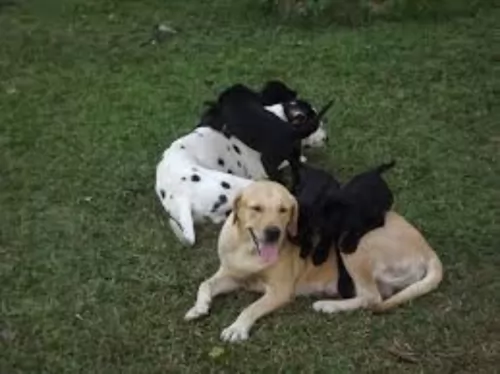 The Dalmador is a hybrid dog and they don’t experience the same health issues that the pure bred dog contends with. The Dalmador has a life expectancy of 10 to 14 years and he can reach this age if you give him all the doggy care he deserves as a 4-legged member of your family.
The Dalmador is a hybrid dog and they don’t experience the same health issues that the pure bred dog contends with. The Dalmador has a life expectancy of 10 to 14 years and he can reach this age if you give him all the doggy care he deserves as a 4-legged member of your family.
Apart from a common dog ailment – hip dysplasia, bloat and obesity are also common problems for your dog.
Bloat is a serious health condition that can actually be fatal because its a twisted stomach where trapped gas puts pressure on the diaphragm.
You will notice the swollen stomach of your pet. Larger breeds are more prone to suffer from bloat because of being deep-chested. Also known as gastric dilatation-volvulus, a vet will need to intervene with this ailment as it can be life-threatening.
 The Pudelpointer is active and healthy and can live up to 14 years and maybe even longer with good care.
The Pudelpointer is active and healthy and can live up to 14 years and maybe even longer with good care.
Owners will do well to know about a couple of the common dog illnesses that can strike at any time -
Some dogs are more at risk for bloating. Larger dogs with deep chests are at greater risk. To help with preventing this deadly ailment, feed your dog a couple of smaller meals a day instead of one big meal that he gobbles up quickly.
Bloat is a medical condition which comes about with a rapid accumulation of gas in the stomach. Canine bloat or gastric dilatation and volvulus is a killer disease. The accumulation of gas can cause the stomach to twist and the dog can go into shock.
Your dog will be trying to vomit, he’ll be panting and pacing, drooling with a hard, swollen stomach.
This is a common illness or condition seen in many dogs, young and old, large and small.It’s a disease which can lead to pain, arthritis and lameness.
The Pudelpointer has floppy ears and loves swimming. The floppy ears are at risk for developing ear infections. Check inside the ears that they aren’t red or have a discharge. Your dog will be scratching his ears a lot.
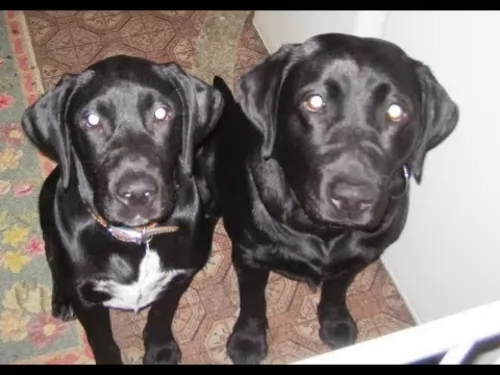 The Dalmador is a medium to large dog so you want to be feeding him one or two bowls of food a day. You want to be giving your Dalmador top-quality food to ensure good health. The lower quality foods are inclined to have ingredients in them that aren’t good for your pet.
The Dalmador is a medium to large dog so you want to be feeding him one or two bowls of food a day. You want to be giving your Dalmador top-quality food to ensure good health. The lower quality foods are inclined to have ingredients in them that aren’t good for your pet.
Always try to include some home-made food into your pet’s diet such as cooked brown rice, cooked chicken and vegetables. You can mix this into some of his dry kibble. It is important to include some raw meat into his diet from time to time as well.
Clean water must be constantly available. Without good quality food and water, you jeopardize the health of your pet.
He isn’t going to require much maintenance so a good brush twice a week will rid him of loose hairs and keep his coat shiny and glossy.
Other things to check regularly are his ears and to brush his teeth 2 or 3 times a week. Don’t neglect giving him a good amount of exercise too.
 Brush your PudelPointer twice a week to get rid of loose hairs.
Brush your PudelPointer twice a week to get rid of loose hairs.
Grooming can be an awesome bonding experience for you and your dog. While you’re brushing him, check him over for any unusual lumps.
Trim the nails if they don’t wear down naturally themselves.
Check inside the mouth for rotting teeth which can be a source of pain and lot of diseases in the body.
Exercise is very important and can come in the form of a walk every day or hikes, swimming as well as ball- and rope games and hide-and-seek.
Provide your dog with a nice warm, comfortable place to sleep.
Your PudelPointer can get to 14 years of age with good food. While you do get some excellent commercially manufactured dog foods, you want to be sure your pet gets some nutritious home-made food too.
Make sure that the kibble is the high quality ones with lots of vitamins and minerals. Boiled chicken, brown rice or pasta and spinach, sweet potatoes and carrots are a healthy choice for your pet – plain and simply just like dogs love it. Chop it up and add it into the dry kibble a couple of times a week.
Some raw meat added in from time to time will help his skin and coat remain healthy. Never leave him without a constant source of fresh, cool water.